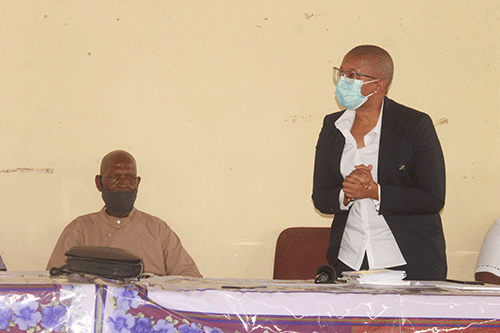MUKWE – The Hambukushu community in Kavango East is opposed to the idea of a community court and prefers their legal disputes to be heard by the traditional court.
This was reiterated to justice minister Yvonne Dausab last week when she paid a courtesy call on Hambukushu Fumu Erwin Munika Mbambo.
“The Hambukushu traditional community is not in support of the community courts. The ministry can come for discussions – but so far, the community is saying they don’t want it here in the Hambukushu traditional authority,” said Alfons Mukerenge, a community member in the same meeting.
A community court becomes operational whenever a community member violates the customary law of that traditional community, and it can approach a magistrate’s court for its decisions to be enforced.
The Hambukushu prefer their traditional court to resolve disputes such as domestic disputes, land ownership issues, goat or cattle theft – and even accusations of witchcraft and claims of discrimination against community members based on their HIV status.
However, this court can also not enforce decisions.
Fumu Mbambo explained the decision to reject community courts is not his, but that the idea comes from the community.
“I have been accused that I have turned down the idea of community courts, and the honourable minister will unyoke me from this accusation. She may convey this message with clear witness and information,” he said.
On her part, Dausab said she has an interest in community courts because they bring the law closer to the people.
“I just wanted to understand why the Hambukushu traditional authority doesn’t have one. Maybe we can come together and discuss the possibility of a community court here, but I will totally understand if the traditional authority has a good system that works; that’s fine also,” she explained.
Without providing details, Dausab noted that other traditional authorities have also rejected community courts.
Meanwhile, Dausab apologised to Mbambo for earlier media reports that angered the Hambukushu community, saying she was misinterpreted when she said the chief crossed the line and was not supposed to preside over a murder case.
“I came to apologise personally because the fumu was not happy with the communication in the media about what happened at the traditional authority. I hope that the chief will forgive me for the miscommunication that happened,’’ she said.
She was referring to information that the Hambukushu traditional authority had fined people it found guilty and responsible for a murder in the area.
“We must understand that we have a constitution; we have laws, and there is a difference between the constitution and laws, and then there is tradition. Everything that we do, we do it in accordance with the constitution as the supreme law, but we also follow other laws and customs,” said Dausab.
Normally, when it comes to crimes such as murder, rape and treason, traditional and community courts will not have a jurisdiction to make a decision about such cases, she said.
“But there is a practice called ‘wiping of tears’ in traditions. That is our traditional practice – and as the minister of justice, I explained to the media the practice is not taken away from the fact that the prosecutor general and the police must investigate murder, rape and other serious crimes in our society,” she said.
Dausab stressed there is no way the minister of justice could say the traditional authority cannot make a decision about ‘wiping of tears’.
“As leaders, we have a responsibility to protect all our people against harm, so when we say the traditional authority does not have authority, what we mean is that if somebody has committed serious crimes in the community, the state has the responsibility to arrest, charge and prosecute that person,” she noted.
However, most people see it as punishing the person twice – they go to jail for the murder – and then at the traditional community, they have to pay compensation.
“We understand that the community is saying to that person that because you have caused us trouble, we want you to do something to help the family; it’s a custom that this society has accepted,” she noted.
Dausab further said they came to educate the public to understand that in a society like Namibia, with a constitution, they must protect the constitution and support those customs and traditional practices that are good for the country as a collective.
- jmuyamba@nepc.com.na


